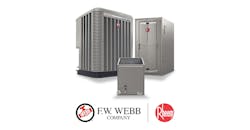Latest from Residential HVAC
Mergers and Acquisitions: Perils, Pitfalls, and — Possibly — Paradise
If you’re considering growing your company through a merger or acquisition, we at Ed’s Heating Cooling Plumbing Electric can offer some good (and hard-learned) advice: acquire companies for the right reasons, and do your due diligence.
Our company was founded in 1986. We provide heating, air conditioning, plumbing, and electric services to residential, commercial, multifamily and health care facilities in the Dayton, OH area. We made our first acquisition, of a competing heating and cooling company, in 2000. Since then we have made several more acquisitions, and have grown about five times in size. And we’re continuing to grow: We had 17 employees in 2007, and 28 today.
We’re proud to have grown in what has been an often-turbulent economy, and the acquisitions we made were key to much of that growth. But it hasn’t always been smooth or easy. They say experience is the best teacher, but experience can be painful. Perhaps other contractors can learn from our experiences, spare themselves some grief, and ensure that a merger or acquisition they’re considering goes smoothly and profitably.
Here’s what we have learned:
Make Aquisitions For The Right Reasons
Look for ways to offer new services to your customer base. We started out as a heating and air conditioning company and added plumbing and electrical services. We focus on improving what we have to offer to our customers. Since we’re going into people’s homes, it made sense to add services we could offer to them while we’re there.
We service a certain area, and our purchases aren’t necessarily made to expand that service area. Again, we’ve had success looking for companies that offer a natural extension of what we can offer to customers. When we acquire another heating and air conditioning company we naturally pick up that company’s customers along with the acquisition. But in the bigger picture it’s really more about letting customers know all the services they can get from one company now. It’s a way to increase our transactions with a particular customer versus trying to chase new customers. Our goal is to grow our customer base by providing more services to existing customers.
Do Your Due Diligence
One of our difficult lessons came early on, when we were acquisition novices. We wanted to grow, we wanted to add plumbing, and we found a company we liked. But it didn’t turn out to be the right company. The company we acquired did more commercial work than residential, and didn’t really have particularly loyal customers. To make matters worse, what we thought we were getting was not what we got. We really didn’t look at their financials thoroughly enough, and we didn’t examine the customer base well enough to get an idea of exactly what we were purchasing.
In that particular instance, there was a lot to work through as far as trying to honor some contracts that weren’t priced right, and correcting mistakes that were made by the previous owner. It was a learning experience as far as knowing what you’re getting into versus thinking and hoping that everything’s right.
The hard lesson we learned is to make sure what you’re looking at is true. Do your due diligence, and get the financials. People can talk a big talk, but verify and ask questions to be sure the business does what they say it does.
Look at the equipment and trucks. Not as the big part of the transaction; there are more significant factors. Goodwill, inventory, and other fixed assets may work as an advantage for tax purposes. (Make sure you consult with your CPA and get legal counsel.) Consider the customer base and the cash flow, this is where your return will come from. A non-compete is essential. Those are the things that will benefit you if you own a company.
Don’t Try To Do It Alone
It’s easy to say, “do your due diligence,” but does everyone know what that entails? We’re contractors, not accountants. Know what you need help with, and get it. You’ll want a CPA to examine the other company’s tax returns, balance sheet, profit and loss statement, and cash flow statement. Have the CPA project a return on your investment.
You’ll want a lawyer on your team to ensure all the paperwork (there will be a lot it) is handled properly. We’ve also worked with a business coach who has been very helpful.
Build a team of people with the expertise to ensure a transaction is sound and — if it is — who will remain positive and be willing to work through hurdles to make it happen.











